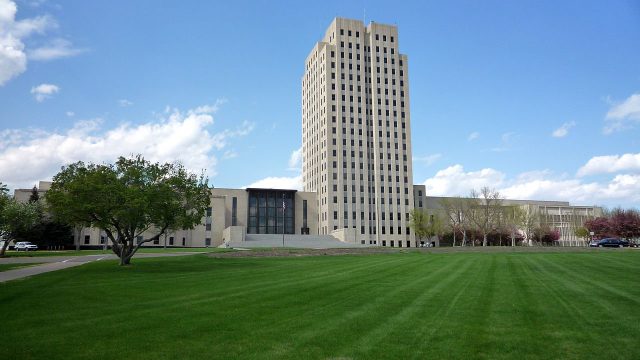Giving Gun Rights Back To Convicted Felons Has A Long History Of Bipartisan Support In North Dakota

In a post yesterday I wrote that North Dakota should make some changes to how some convicted criminals might get their gun rights back. This is an important topic right now after Fargo police officer Jason Moszer was shot during a standoff with a man named Marcus Schumacher who was in possession of guns despite a previous felony conviction dating from the 1980’s.
Unfortunately, there’s also a lot of confusion around this debate.
For one thing, we don’t actually know how Schumacher obtained his weapons. Did he buy them himself? Did they belong to another member of his family? Did he borrow them or steal them? We don’t know, which makes it difficult to debate our gun laws in the context of the Schumacher/Moszer incident.
For another, thanks to some bad reporting from Valley News Live, a lot of people aren’t even understanding which of our laws applies to the situation. The VNL report assumed that it was process created the 2011 legislative session which allows convicted felons to petition the courts to restore their gun rights. But Schumacher didn’t need to petition the court, and there’s no record that he did. Instead, a different area of the law gave him his gun rights back a decade after his sentence and parole were completed.
And that part of the law has an interesting history.
I’m talking about section 62.1-02-01 of the North Dakota Century Code entitled, “Persons who are not to possess firearms.” That law allows for some violent felons to get their gun rights back 10 years after conviction. It also allows for non-violent felons to get their gun rights back after five years.
I did some research on the legislation, and it turns out it was created by the Legislature in 1985 in a bill that, among other things, also created North Dakota’s concealed carry law. You can read the original legislation here. It was House Bill 1069 and was introduced at the request of Legislative Council with the intent being to bring North Dakota into line with new federal gun laws.
This excerpt from the bill is how the language looked originally:
Based on the records available, it doesn’t seem to have been controversial policy at all. You can read the minutes from the Interim Judiciary Committee which reviewed the legislation here. The House and Senate journals from the 1985 session show that the legislation passed unanimously in the House (one notable vote was from state Rep. Jack Dalrymple, now our governor) and on a 46-7 vote in the Senate.
During the 2007 legislative session this language was reviewed by the Legislature (this time to address the issue with restoring gun rights to criminals convicted of crimes in other states). The bill amending the law was Senate Bill 2213, and it had some interesting sponsors.
Like Senator Stanley Lyson of Williston, a former sheriff and head of the North Dakota Peace Officers Association, who served in Legislature from 1999 to 2014.
And Senator Joel Heitkamp, currently a left-wing talk radio host for KFGO in Fargo.
Also, Rep. Blair Thoreson who, as I pointed out in my post yesterday, is now vowing a change to these laws.
You can read the bill history here, including records showing unanimous support for it in both the House and Senate judiciary committees. It went on to unanimous support in both House and Senate floor votes.
So, in summary, the history of our state’s law automatically giving gun rights back to some felons – even those guilty of violent offenses – starts in 1985 and has had nearly unanimous support from lawmakers since then.
I am a staunch supporter of gun rights, but I think maybe it is time for a change.
Giving non-violent felons their gun rights back after their sentence, probation, and restitution are all completed would be fine with me. But felons guilty of violent crimes should never, ever get their gun rights back automatically.
If they are to get their gun rights back at all it should be through a petition to the courts (the process set out in the 2011 legislation I mentioned above) where prosecutors and/or victims are allowed to have a say.






